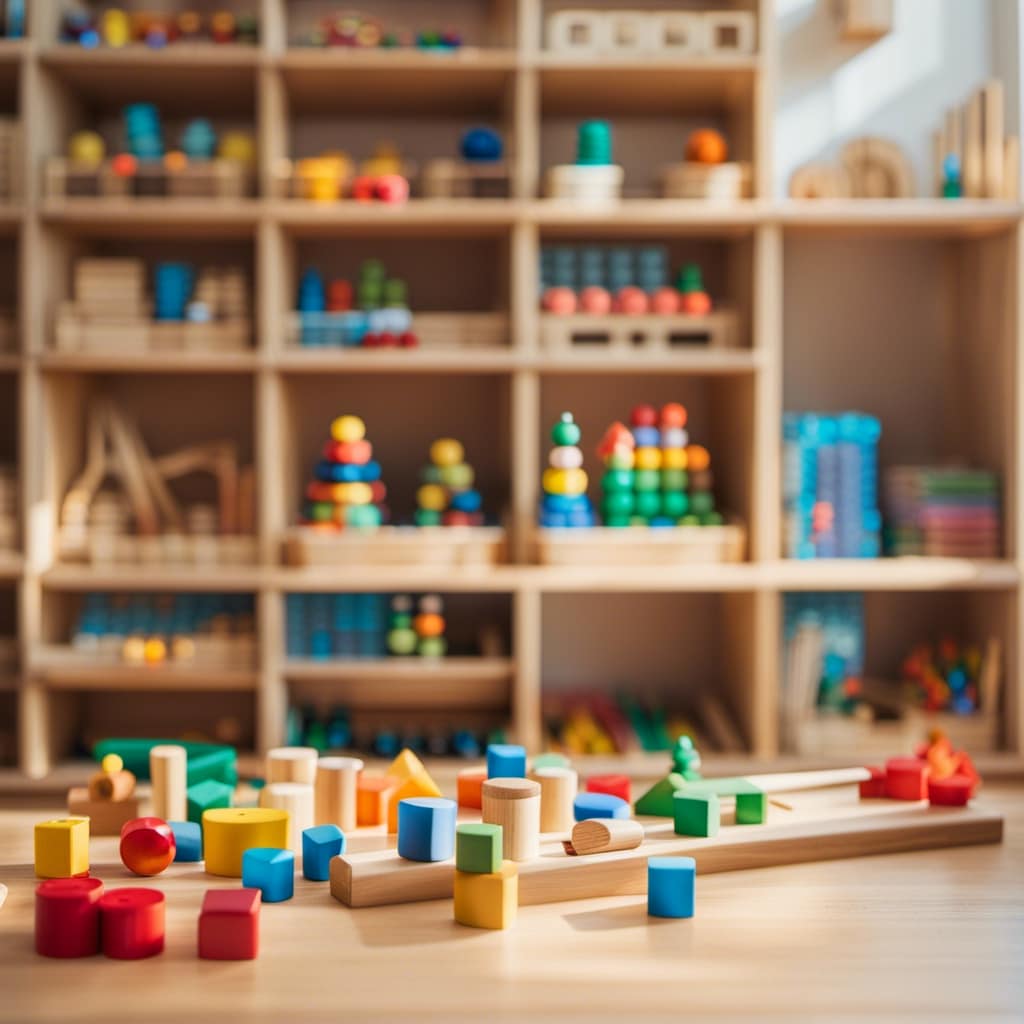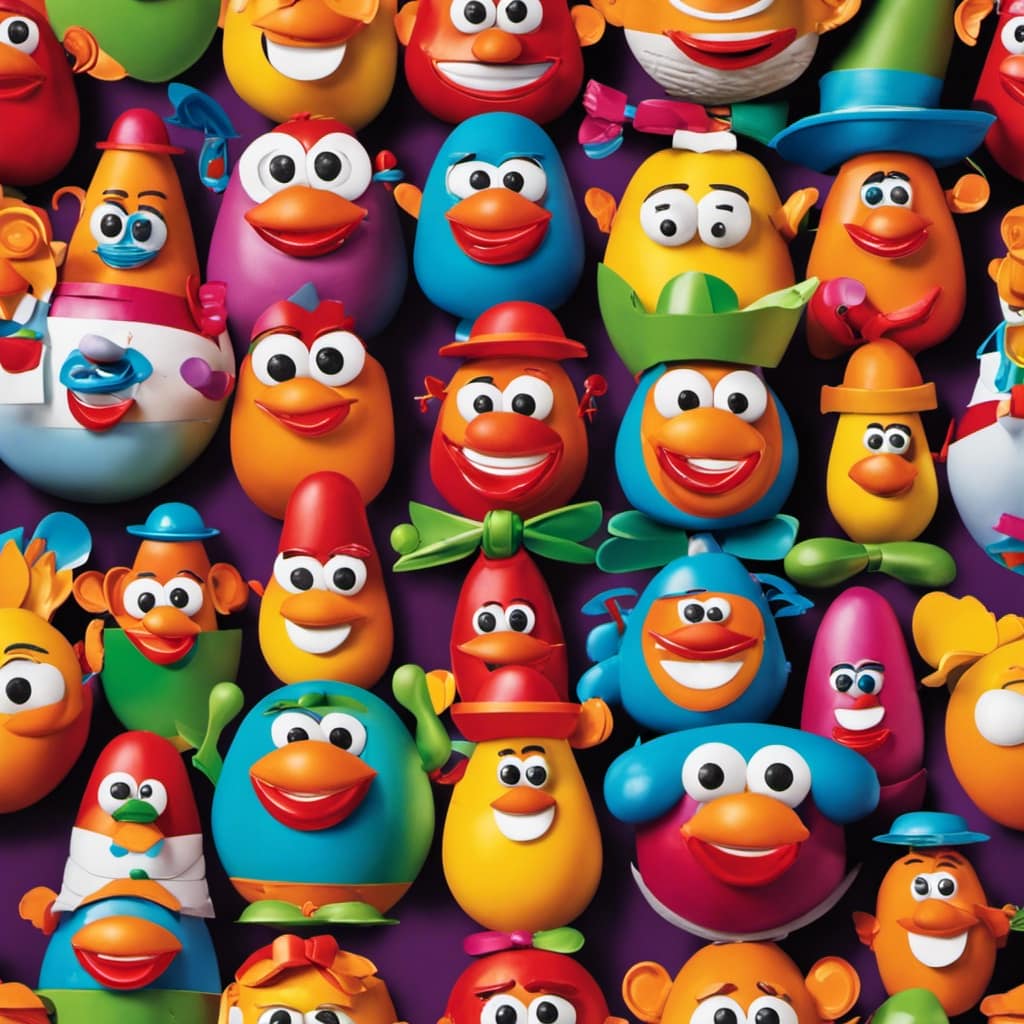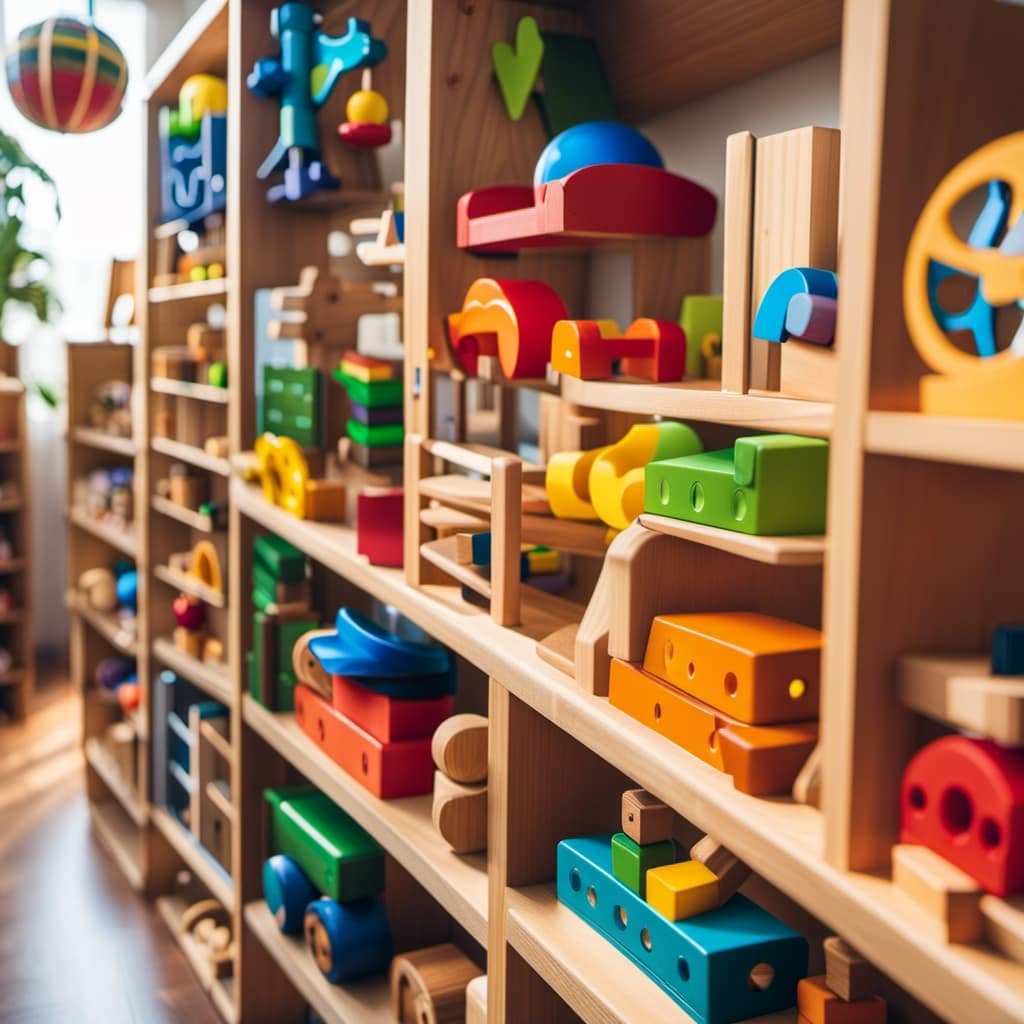As a parent, I always seek out toys that entertain my child and promote their development. Did you know that Montessori toys are scientifically proven to stimulate a child’s growth through play?
These educational toys are designed to enhance fine motor skills, problem-solving abilities, and spatial awareness. They engage children in hands-on activities that foster critical thinking and independent exploration.
With Montessori toys, children can develop essential life skills, stimulate their creativity, and improve their cognitive and social-emotional intelligence.
Get ready to discover the incredible benefits of Montessori toys for your child’s growth and learning.
Key Takeaways
- Montessori toys promote self-directed activity and hands-on learning.
- They support the development of fine motor skills, hand-eye coordination, problem-solving, and spatial awareness.
- Montessori toys foster a love for learning and exploration.
- They enhance cognitive development by promoting problem-solving skills and independent thinking.
The Benefits of Montessori Toys for Fine Motor Skills Development
Montessori toys have been incredibly beneficial for my child’s fine motor skills development. These toys provide a wide range of fine motor skills activities that engage and challenge toddlers. Through sensory play, Montessori toys stimulate their senses and encourage exploration.
Activities like stacking blocks and threading beads require precise movements, improving finger dexterity and grasp control. These toys also enhance hand-eye coordination, as children learn to manipulate objects and complete puzzles. Fine motor skills are closely linked to cognitive abilities and academic achievement, making Montessori toys an essential tool for overall cognitive development.

Additionally, the tactile element provided by these toys stimulates the senses and further improves hand-eye coordination in a fun and interactive way. With Montessori toys, my child has not only developed fine motor skills but also gained a love for learning and exploration.
Enhancing Problem-Solving Abilities Through Montessori Toys
Engaging with these educational playthings challenges me to think creatively and find solutions. Montessori toys are designed to encourage critical thinking skills and problem-solving abilities in children. By exploring problem-solving strategies, children learn to approach challenges with a logical and analytical mindset.
These toys provide open-ended play opportunities that require persistence and determination, promoting perseverance in finding solutions. Making choices and decisions while playing with Montessori toys enhances decision-making skills and self-confidence. The freedom to use imagination fosters creativity and innovative problem-solving. Children are encouraged to explore different possibilities and find their own unique solutions.
Through hands-on activities, such as manipulating objects and completing puzzles, children develop their problem-solving abilities. Montessori toys play a crucial role in fostering critical thinking skills and empowering children to become independent and resourceful problem solvers.
Fostering Autonomy and Self-Confidence With Montessori Toys
Exploring and interacting with these educational playthings has empowered me to take control of my own learning, fostering a sense of autonomy and self-confidence. The Montessori toys I have engaged with have played a significant role in fostering independence and building self-esteem. Here are three ways Montessori toys have helped me develop these important qualities:
-
Encouraging self-directed learning: Montessori toys are designed to support self-directed exploration and learning. They provide a wide range of materials and activities for children to choose from, allowing them to make decisions and take responsibility for their own education. This freedom to learn at their own pace and follow their interests fosters independence and a sense of ownership over their learning journey.

-
Promoting problem-solving skills: Montessori toys often offer open-ended play opportunities that require children to think critically and find solutions. By engaging with these toys, I have learned to approach challenges with confidence and perseverance. This process of problem-solving not only builds my self-esteem but also enhances my ability to tackle real-life problems outside of playtime.
-
Instilling a love for learning: Montessori toys are designed to promote a love for learning and exploration. By engaging with these toys, I have developed a natural curiosity and a genuine desire to acquire new knowledge. This love for learning has not only boosted my self-esteem but has also fostered a sense of independence as I actively seek out new information and engage in self-directed educational activities.
Montessori Toys: Preparing Children for Success in School
Preparing children for success in school has been a key focus of my experience with these educational tools. Montessori toys play a crucial role in encouraging independent learning and supporting self-directed play, which are essential skills for academic achievement. These toys provide a wide range of materials and activities for children to choose from, allowing them to develop skills at their own pace. By engaging in hands-on learning experiences, children are encouraged to explore, problem-solve, and think critically. Montessori toys also foster a love for learning and exploration, which sets a strong foundation for academic success. Supporting self-directed play enables children to take ownership of their learning, make decisions, and develop a sense of responsibility. By incorporating Montessori toys into early childhood education, we can effectively prepare children for success in school by promoting independent learning and supporting self-directed play.
| Encouraging Independent Learning | Supporting Self-Directed Play | Preparing Children for Success in School |
|---|---|---|
| – Promotes exploration and curiosity | – Encourages decision-making and responsibility | – Develops a love for learning and exploration |
| – Fosters problem-solving and critical thinking skills | – Supports imaginative play and creativity | – Enhances independent learning and self-confidence |
| – Develops self-motivation and perseverance | – Promotes social and emotional intelligence | – Supports academic achievement and cognitive development |
The Cognitive Development Impact of Montessori Toys
I have witnessed firsthand the positive impact of Montessori toys on cognitive development. They encourage problem-solving, critical thinking, and independent learning. Montessori toys play a crucial role in promoting independent learning by providing opportunities for children to explore and discover new concepts on their own.
They engage children in hands-on activities that require critical thinking and problem-solving skills. Manipulating objects and completing puzzles develop their problem-solving abilities. The freedom to use their imagination fosters creativity and innovative problem-solving.
Montessori toys also enhance cognitive development by promoting spatial awareness. Activities like stacking blocks and fitting puzzle pieces together develop their understanding of space.

Overall, Montessori toys stimulate cognitive development and foster independent learning, empowering children to take control of their own educational journey.
Improving Hand-Eye Coordination With Montessori Toys
Enhancing hand-eye coordination is a key benefit of engaging with Montessori toys. Montessori toys are specifically designed to improve fine motor skills and hand-eye coordination in toddlers. Activities like stacking blocks and threading beads require precise movements and visual tracking, which are essential for developing hand-eye coordination.
Montessori toys also provide a tactile element that stimulates the senses, contributing to sensory development in children. By engaging with these toys, toddlers can improve their hand-eye coordination in a fun and interactive way.
In addition to improving hand-eye coordination, Montessori toys also promote sensory development. Sensory balls engage multiple senses, textured blocks stimulate sensory pathways, and sensory bins filled with rice or sand provide tactile experiences.
Overall, Montessori toys play a crucial role in enhancing both hand-eye coordination and sensory development in toddlers.
Stimulating Spatial Awareness Through Montessori Toys
Exploring different shapes and sizes of objects helps me understand spatial awareness and how things fit together. Enhancing spatial reasoning with Montessori toys provides children with valuable opportunities to develop problem-solving skills.

Through these spatial awareness toys, children can engage in activities that require them to manipulate and move objects, improving their fine motor skills and hand-eye coordination. By stacking blocks and fitting puzzle pieces together, children develop an understanding of space and how objects relate to each other. This enhances their spatial reasoning abilities, which are crucial for problem-solving.
Montessori toys not only stimulate creativity and imagination but also foster cognitive development and critical thinking. By engaging in hands-on play with these toys, children can enhance their problem-solving skills and develop a strong foundation for future academic success.
Inspiring Creativity and Imagination With Montessori Toys
Stimulating my creativity and imagination, Montessori toys provide a platform for free expression and exploration. They allow me to discover and express unique ideas and stories.
Montessori toys are not just toys; they are tools that foster creative play and inspire imagination. Through open-ended play, these toys encourage me to think outside the box and come up with my own narratives and scenarios. They provide endless possibilities for storytelling, role-playing, and creating my own world.
Additionally, Montessori toys also promote sensory development. With various textures, shapes, and materials, they engage my senses and enhance my sensory perception. From soft sensory balls to textured blocks, these toys provide a tactile experience that stimulates my senses and helps me explore the world around me.
Montessori toys truly ignite my creativity and allow me to fully immerse myself in the joy of play.

Developing Essential Life Skills With Montessori Toys
Developing essential life skills, I learn responsibility and independence through engaging with Montessori toys that teach me practical skills like pouring, dressing, and organizing.
These toys are designed to promote hands-on learning and encourage independent thinking. They provide a platform for children to practice real-life tasks and develop fine motor skills, hand-eye coordination, and problem-solving abilities.
Montessori toys empower children to take control of their own learning by providing materials and activities that they can choose from. By engaging with these toys, children develop practical skills that are essential for everyday tasks and foster independence.
Montessori toys not only enhance cognitive development but also promote a love for learning, exploration, self-confidence, and self-esteem. They play a significant role in developing practical skills and encouraging independence in children.
Promoting Social and Emotional Intelligence Through Montessori Toys
In my previous discussion about developing essential life skills with Montessori toys, I highlighted the importance of promoting independence, self-confidence, and responsibility. Now, let’s delve into another crucial aspect of child development that Montessori toys excel in: promoting social and emotional intelligence.
Montessori toys provide opportunities for children to engage in cooperative play, which is essential for developing empathy skills and fostering positive relationships with others. Through activities like building blocks together or engaging in pretend play scenarios, children learn the importance of sharing, taking turns, and listening to one another. These interactions help them understand different perspectives, develop empathy, and practice emotional regulation during play.

Frequently Asked Questions
Are Montessori Toys Suitable for Children of All Ages?
Yes, Montessori toys are suitable for children of all ages. They provide numerous benefits for child development, including promoting self-directed learning, enhancing fine motor skills, and fostering creativity and problem-solving abilities.
How Do Montessori Toys Contribute to the Development of Sensory Skills?
Montessori toys, with their sensory elements, contribute to the development of sensory skills in children. By engaging with these toys, children refine their fine motor skills while enhancing their cognitive abilities.
What Are Some Examples of Montessori Toys That Promote Independent Thinking and Decision-Making?
Montessori toys that promote independent thinking and decision-making include open-ended puzzles, building blocks, and sorting games. These toys encourage children to problem-solve, make choices, and think critically, fostering their autonomy and self-confidence.
Can Montessori Toys Be Used in a Classroom Setting?
Yes, Montessori toys can be used in a classroom setting. They offer numerous benefits such as promoting independent thinking and decision-making, enhancing fine motor skills, and fostering a love for learning.
How Do Montessori Toys Support the Development of Social Skills and Empathy?
Montessori toys support social skills and empathy by promoting cooperative play and fostering emotional intelligence. Interacting with these toys encourages sharing, empathy, and emotional regulation, creating opportunities for children to develop social and emotional intelligence.
Conclusion
In conclusion, Montessori toys are an invaluable tool for promoting child development through play. Research has shown that these toys not only enhance fine motor skills and problem-solving abilities, but also foster autonomy, self-confidence, and cognitive development.

Additionally, they stimulate spatial awareness, inspire creativity and imagination, and teach essential life skills. A fascinating statistic to consider is that a study conducted by researchers at the University of California found that children who played with Montessori toys showed a 67% increase in problem-solving abilities compared to those who did not. This showcases the significant impact these toys can have on a child’s cognitive development.










